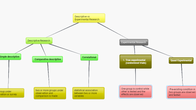top of page
Research methodology is the most important part of any research paper for persuading the audience that research is fruitful for a research study that is being conducted. A constructive research methodology is the essence of an entire research strategy whether it be quantitative or qualitative. Research methodology sufficiently explains the methods used in the research study. It is imperative from a research methodology point of view to explain the reasons for preferring one research strategy over others. Additionally, it is also important to justify how this strategy will be useful for finding the answers for a particular research question. There are three important parts of research methodology; Description of methods, Justification of the choice of methods and Connecting the research methods to research goals.
-
Description of methods
A. Restate the research problem
For writing a perfect research methodology, the first step would be restating the research question that the researcher wants to explore in the research study. Therefore, the inclusion of the hypothesis is important. There are two important consideration which a researcher must not forget;
-
When restating the research question, the researcher should include all assumptions that a researcher thinks important for a research question. Often researchers forget to mention the underlying assumptions which they should not! Based on these assumptions, the researcher will also put some light on the chosen research method.
-
A researcher should describe the variables that he or she is going to test. There can be other situations or conditions equivalent of variables which a researcher controls, should also be described in the research methodology section of a research study.
B. Designing the approach for research methodology
The entire approach of a research study could be either qualitative or quantitative. In other cases, research methodology approach could be a mixture of both quantitative and qualitative. However, it is necessary to explain the causes of why a researcher has chosen the “specific approach”. Let’s put it this way, why research has chosen a quantitative approach for carrying out research but not qualitative or mixed method approach.
These are the consideration which a researcher must follow in designing a specific research methodology approach;
-
For quantifying social trends or the impact of certain policy then the researcher must adopt a quantitative approach. Quantitative research can be conducted using statistical tools for data collection.
-
For extracting results from opinions, reviews and getting the familiarity with certain issues, the researcher may go for qualitative research.
-
There are some research topics which require the use of both quantitative method and qualitative method. For example, a researcher needs to quantify the social trends and then researcher uses qualitative tools for interpretation or understanding these trends. This method is referred to as a mixed method approach.
C. Explain the data collection procedure
Important things to be included in explaining the data collection procedure;
-
When the study was held?
-
Location of the research study
-
Parameters which ensure the collective objectivity of the research
These are the considerations for explaining the data collection procedure in research methodology;
-
If surveys are part of your research study then it is important to answer these questions;
-
How the survey was held?
-
Where it was held?
-
What is the research question?
-
How many surveys were conducted?
-
How much time was taken to respond to a complete survey?
-
However, it is imperative to state enough detail so that other researchers could take information and incorporate it into their research of the same field of study.
D. Justification of unfamiliar methods
It has been observed that social sciences research studies may require some orthodox methods for successful completion. Such methods usually do not seemingly comply with the design of the overall study. Therefore, the researcher needs to provide comprehensive justification.
-
Generally, qualitative methods need more comprehensive details
-
But, if the researcher is using some basic investigative methods then the researcher is not needed to provide extended details because it is assumed that readers are already enough familiar with such procedures.
E. Cite the resources for adopting the specific research methodology
A researcher needs to cite all the resources which helped to articulate and apply specific research methodology. A researcher needs to put some light on the following aspects;
-
Define the work of resources
-
How a specific resource help the researcher in the articulation of research methodology?
-
What is the contribution a researcher is providing to build on the work of a resource?
Supposedly, when crafting a survey a researcher might find questions from different resources. Therefore, it is legit to cite those resources that contributed to a survey compilation.
2. Justification of the choice of research methods
A. Explain the selection procedure of research methods
For the collection of primary data, a researcher always sets some parameters. Therefore, in research methodology, it is imperative to describe the reasons behind using those parameters and the contribution of parameters in the research. However, certain consideration should be focused on explaining the selection procedure of research methods;
-
It is important to describe the list of participants and how the researcher made the group of participants for conducting the research. Also, include the selection criteria for the participants. Explain the inclusion and exclusion of a specific participant group.
-
Secondly, provide justification of sample size and determine that if the selected sample size will be enough to apply the study results to the general population. For example, if a sample size of 30% of university students has been chosen then state that the study will be applicable to the whole university population? Or if the study will also be applicable to the population of another university?
B. Provide justification of any weakness in research method
There are always some weaknesses and strengths associated with a research method. Therefore, in research methodology, it is necessary to distinguish the research from any kind of weakness and provide comprehensive details of how the research method is chosen is irrelevant to these weaknesses.
-
For identifying the common weakness associated with research methods would be reading other research papers. Then discuss in detail that those weakness does not apply to the research method the researcher is opting.
C. Explain overcoming the constraints
It would be extremely effective if the researcher explains the procedures for overcoming the obstacles. A researcher faces many kinds of obstacles during the whole of the research process. This act will enhance the confidence of the audience that the researcher is adept is solving problems.
-
For example, a researcher may experience some problem during data collection. When writing a research methodology, a researcher must describe how a researcher has avoided the problem to affect the results.
D. Evaluate the alternative methods
Sometimes, a researcher may opt the most unusual research method for the study. Therefore, highlight why a researcher has not chosen the most expected methods that are mostly used for this kind of study.
-
For example, most of the research topics were using the same kind of research methods but were not yielding results applicable to reality. Therefore, the researcher wanted to explore a research method which might yield results quite applicable to humans for real.
3. Connecting the research methods to research goals
A. Explain the procedure of analysis of results
Often analysis depends on the methods of research that was selected may it be a quantitative, qualitative or mixed method. For the quantitative method, a researcher will describe the procedure of using statistical tools. For the qualitative method, a researcher will use theoretical perspectives and philosophy. For a mixed method, a researcher will be needed to describe both; statistical analysis and theoretical perspectives.
B. Describe how the analysis match the research objectives
It has been noted that a research methodology is always capable enough to produce the results. If the research methodology does not suit to research objectives then there is a need to adjust the research methodology or change the research question.
-
For example, a researcher focusses to find the effects of university education on the rural settings of Japan. Then conducting interviews for the students belonging to rural settings would not provide sufficient and satisfactory results. For finding the satisfactory results, research should use statistical tools and quantitative method.
C. Explore how analysis answers the research question
A common practice would be relating the research question to the research methodology and provide the expected results that the research will yield. There should be a detail contemplating the specific results will show considering a particular research question.
-
Sometimes, answering research questions may create more questions. It is important to elaborate on those questions as well.
D. Find out if the findings are generalized or transferred
Mostly, research findings can be generalized to other research studies or can be transferred to similar topics or contexts. However, it does not happen in qualitative research or research pertaining to social trends.
-
Quantitative research findings can be transferred or generalized to other similar context studies.

bottom of page






















